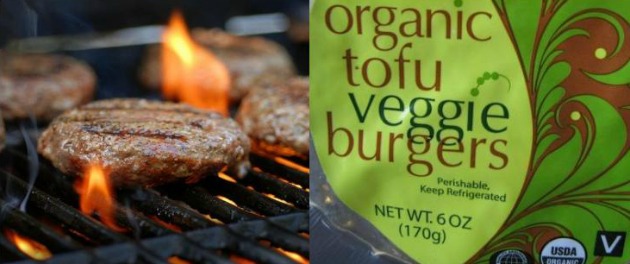 It’s barbecue time, and scare stories are already in the news about the dangers of cooking meat, fish and poultry on the grill. Most of those warnings concern the formation of carcinogens and mutagens known as heterocyclic amines (HCAs) during the grilling process.
It’s barbecue time, and scare stories are already in the news about the dangers of cooking meat, fish and poultry on the grill. Most of those warnings concern the formation of carcinogens and mutagens known as heterocyclic amines (HCAs) during the grilling process.
While it’s probably wise to enjoy barbecue meat such as char-broiled steaks and blackened catfish only as an occasional special treat, these news reports leave out a very important fact.
The greatest danger from heterocyclic amines (HCAs) is not from barbecue meat or grilled steaks. Rather, it is from processed and packaged protein foods including veggie burgers and other approxi-meats.
Industrially processed proteins derived from soy, corn, wheat and other grains contain plenty of HCAs, and the levels only increase with the addition of flavor enhancing soy sauces and marinades.
It’s myth that HCAs are mostly found in fried or grilled beef, poultry and fish. The truth is that HCAs are formed in any pyrolyzed, protein-rich food. For example, soy protein plus sugar subjected to high heat and pressure at the processing plant ends up with potent mutagens such as 2-amino-9H-pyrido (2,3-b) indole and 2-amino-3-methyl-9H-pyrido (2,3-b) indole.
All commercial soy sauces come right out of the bottle with HCAs known as 1-methyl-1,2,3,4-tetrahydrobeta-carboline-3-carboxylic acid (MTCCA). When we add sugar to soy sauce — a combination found ready made in many marinades and barbecue sauces — even more heterocyclic amines are formed.
The beta carbolines found in commercial ketchups and fish sauces also spur the formation of additional HCAs.
In brief, the higher the heat and pressure and the longer the duration, the more HCAs are formed. Combine with sauces and other ingredients high in HCAs, heat again and even more are formed.
Because modern plant protein products such as textured vegetable protein (TVP) and soy protein isolate (SPI) may undergo three or more heat treatments before they reach the supermarket or health food store, they can carry high levels of HCAs. These industrially processed foods are likely to contain much higher levels of HCAs than real foods prepared at home.
The more types of HCAs found in a given product or meal, the greater the risk. As T. Sugimura of the National Cancer Center Research Institute in Tokyo puts it:
“Heterocyclic amines are probably involved in the development of human cancer in the presence of other carcinogens, tumor promoters and factors stimulating cancer progression. HCAs most affect the liver, but lung and stomach tumors, lymphomas, leukemias and myocardial lesions also occur.”
Should we be worried about HCAs?
The short answer is “yes.”
HCAs appear naturally in the body, but never in the quantities provided by today’s overly — and repeatedly — heated food products. In animal studies, mutagenic HCAs are most likely to turn carcinogenic when eaten regularly rather than sporadically. HCAs are also most likely to trigger human cancer in the presence of other carcinogens. Thus the consistent presence of nitrosamines, MSG and HCAs in heavily processed plant protein foods poses a triple threat.
To date most of the news stories on HCAs has centered on grilled and barbecue meat, fish and poultry. Grilled tempeh and tofu would probably gain some HCAs this way as well.
The real danger though is not from putting traditional real foods such as meat, poultry, fish, tempeh or tofu on the barbie, but eating industrially processed plant proteins. HCAs do pose health risks, but most are formed at the processing plant, not in the home kitchen or on the patio.
Sources
For an extensive discussion of the research on HCAs in soy and other highly processed industrial foods and a list of citations, read Chapter 11 of The Whole Soy Story: The Dark Side of America’s Favorite Health Food (New Trends, 2005).







You had me worried, for a moment I thought you were promoting tofu!
It defeats the purpose to be a vegan or a vegetarian and eat vegetarian BEEF…vegetarian HAM…vegetarian BACON. Just go eat a burger and stop playing smh
I have read several articles stating that marinating meats before grilling cuts down on many of the carcinogenic chemicals that are produced. Interestingly enough, most people who grill will find the fact that dark the beers were one of the best things to use. I also noted that basically ANY marinade was better than nothing. The article also mentioned not to eat the burnt parts as this was the place where most of the carcinogens are located. Happy grilling!